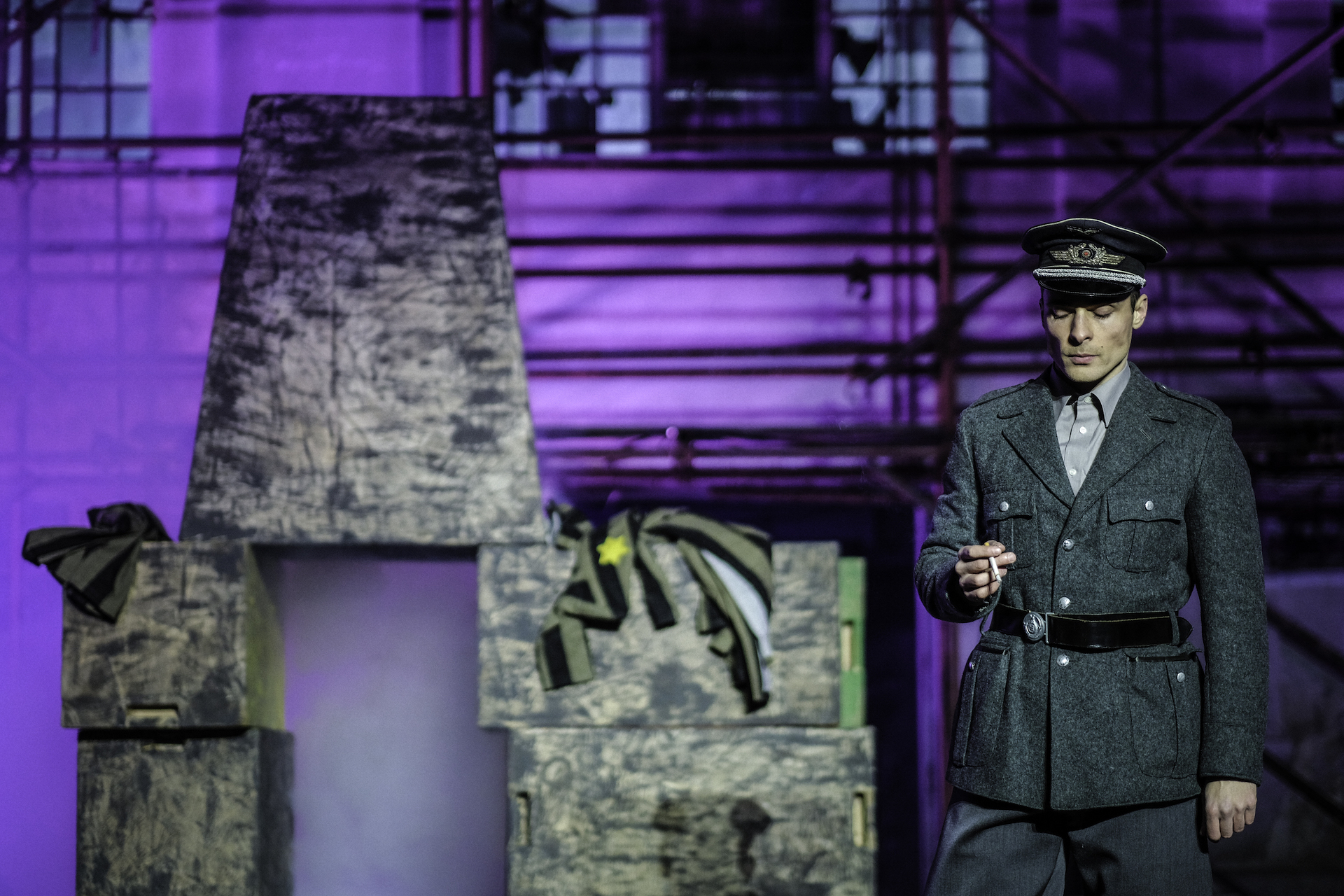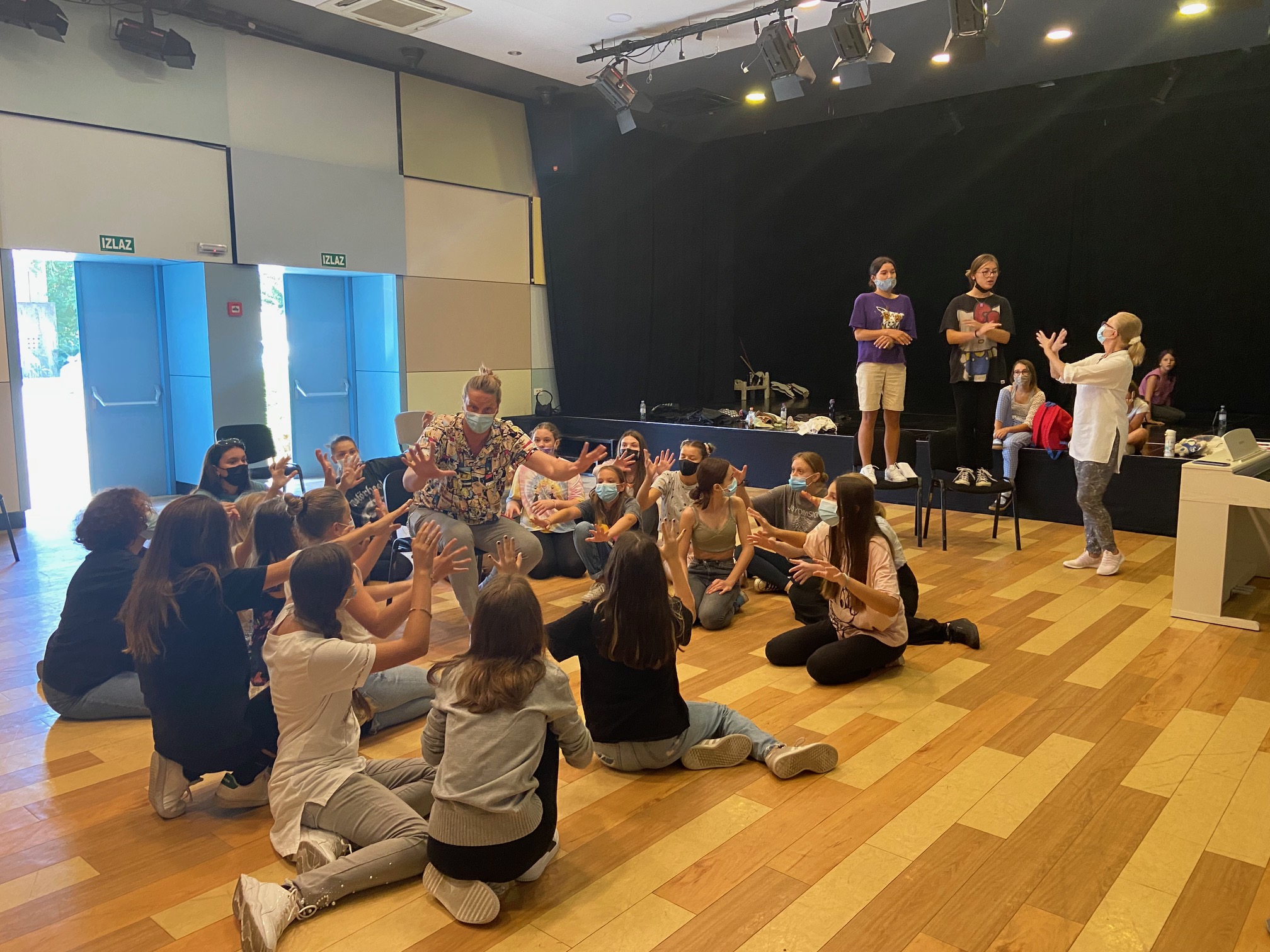Jasenovac Memorial Site
October 1, 2021 // 12h & 14h
October 2, 2021 // 12h & 14h
"Brundibár" is an opera by the Jewish Czech composer Hans Krása (1899-1944) with a libretto by Adolf Hoffmeister, originally performed by the children of Terezín, a concentration camp in occupied Czechoslovakia, and comes from Czech colloquialism for the bumblebee.
Krása and Hoffmeister wrote the opera in 1938 for a competition by the Czechoslovak Ministry of Education and Public Education, which was later canceled. Rehearsals began in 1941 at a Jewish orphanage in Prague, which served to temporarily educate children who had been separated from their parents due to the war. In the winter of 1942, the opera was performed for the first time in an orphanage. By July 1943, almost all the children of the original choir and orphanage staff had been taken to Terezín. Only the librettist Hoffmeister managed to escape from Prague in time. United with actors and singers in Terezín, Krása reconstructed the opera to suit the instruments available at the camp: flute, clarinet, guitar, accordion, piano, percussion, violin, cello and double bass. On September 23, 1943, "Brundibár" premiered in Terezín and was performed a total of 55 times.
A special performance of "Brundibár" was held in 1944 for representatives of the Red Cross who came to inspect the living conditions in the camp. What the Red Cross did not know at the time was that most of what they saw during the visit was a farce as many prisoners were deported to Auschwitz to reduce the number of people during their visit. A performance of "Brundibár" was also made for the Nazi propaganda film "Terezín: A Documentary Film from a Jewish Settlement" (Theresienstadt. Ein Dokumentarfilm aus dem jüdischen Siedlungsgebiet). All participants in the production of the film were loaded into trucks and sent to Auschwitz as soon as filming was completed. Most ended up in gas chambers immediately upon arrival, including children, composer Krás and musicians.
 *Croatian premiere, Zagreb 2018.
*Croatian premiere, Zagreb 2018.
The Croatian premiere of the opera was held on January 27, 2018, on the International Holocaust Remembrance Day, in front of the First Croatian Oil Factory in Zagreb, the future space of the Center for the Promotion of Tolerance and Preservation of Holocaust Remembrance. By setting up an opera in the area of the former Jasenovac concentration camp and new performances of the children's opera "Brundibár", the idea is to commemorate the Jasenovac victims and to remind of the crimes of the Jasenovac camp so that they would never happen again.
About the composer:
Hans Krása (1899-1944) grew up in his native Prague which was a major crossroads during a transitional period in European musical life. Had his life not been interrupted in the Holocaust of World War II, Krása might have become an influential composer of his generation. He learned to play the piano and violin as a child and continued to study composition with Aleksandar Zemlinski. After graduating from the German Academy of Music in Prague, he became a singing teacher at the Prague German Theater, and briefly worked in Berlin at the Kroll Opera before returning to Prague. Although he had a thorough knowledge of classical and romantic masters, Krása was influenced by new trends of the early twentieth century, especially Impressionism and other French music. Krása self-consciously sought to reconcile traditional tonality and modernism. About his musical style, Krása wrote: "I am bold enough, as a modern composer, to write melodic music. It reflects my whole attitude towards music, whether it is called modern or otherwise."
Krása, a Jew and anti-fascist, was arrested by the Nazis on August 10, 1942 and sent to the Terezín concentration camp. Like other Czech composers - Viktor Ullmann, Gideon Klein, Pavel Haas - Krása became part of an exceptional creative community. The children's opera "Brundibár", reconstructed by Krása in Terezín, is the core of an extraordinary legacy that includes many works.
On October 16, 1944, Krása was deported to Auschwitz and killed two days after his arrival.
 *Croatian premiere, Zagreb 2018.
*Croatian premiere, Zagreb 2018.
Opera for children in two acts
Composer: Hans Krása
Libretto: Adolf Hoffmeister
Croatian version: Ana Tonković Dolenčić, Marija Tonković
Anuška and Jožica's mother is ill, so they go to the market to buy her some milk. They have no money, but they notice that every time the organ grinder Brundibár played, passers-by would give him money. Anuška and Jožica sing two songs, but no one listens. They try to dance to the beats of Brundibár's music, but the organist chases them away, announcing loudly that he doesn't like the children at all. Night is coming. The children are scared and confused: how to beat Brundibár and earn money for milk? A sparrow, a cat and a dog appear and help Anuška and Jožica create a plan on how to defeat a tyrant with the help of friends.
Directors: Krešimir Dolenčić i Hrvoje Korbar
Conductor: Ivan Josip Skender
Producer: Nataša Popović
Ensemble:
Brundibár: Božidar Peričić, baritone
Director: Zoran Pribičević
Ballerina: Gita Peričić
Choral Studio "Zvjezdice":
Anuška: Gita Erben, alternation: Karla Fiket
Jožica: Gita Hajdarhodžić, alternation: Iva Milat
Dog: Ani Gnand, alternation: Nika Lešić
Cat: Tena Purgar, alternation: Karla Fiket
Sparrow: Bianca Sente, alternation: Laura Vodopija
Guard: Lucija Milojčić, alternation: Glorija Pinturić
Ice Cream Man: Stella Božić, alternation: Veronika Ivančić
Milkman: Nina Rašković
Baker: Sara Svečnjak
Choir: Nina Dragičević, Ana Drdić, Lucija Matek, Eliza Ljubić, Mihaela Lukačević, Marta Benić, Nea Martinović, Zoya Shitov, Manda Perica, Rene Radišić, Mara Mihaljević, Ana Horvat, Klara Jakopović, Dora Šragalj, Laura Dimitrijević, Tia Juriša, Petra Škulić, Ema Šutej, Franka Kaliman, Lea Zgrabljić, Tia Lojo, Antea Vrčić, Tonka Milat
Artistic director of the choir: Zdravko Šljivac
Choir's producer: Tihana Jokić
Vocal coaches: Dijana Rogulja Deltin i Paulina Kelava Vidović
Musicians: Pedro Abreu, Val Bakrač, Marija Bašić, Dijana Bistrović, Borna Dejanović, Oliver Đorđević, Peter Firšt, Domagoj Guščić, Ivan Jakšeković, Bruno Philipp, Fran Krsto Šercar, Leopold Stašić
Music producer, editing, mix and mastering: Krešimir Seletković
Organization and rental of instruments: Tin Matijević
Costume design & dolls: Patricio Alejandro Aguero Mariño
Costumes & props: Jadran film d.o.o.
Makeup & hair: Ivana Šimunić
Sound engineer: Vatroslav Mlinar
Stage movement and choreography: Ljiljana Gvozdenović
The original scenography and props were performed by students of the Academy of Fine Arts, University of Zagreb (2018): Petar Joši, Jelena Kovačev, Ivan Nestić, Matea Šiprak, Eva VučkovićRestoration of scenography and props (2021): Marta Dolenčić & Magdalena Biškup
Visual design of posters and visual identity of the opera: Tin Samaržija, student of the Academy of Fine Arts and mentor Natalija Nikpalj (2018)
Production equipment: Alibi Sound
PR: PRiredba Studio
Schools coordinator: Katarina Juras
Protocol: Antonija Tomičić * Brundibár rehearsal, CKM, Zagreb, September 2021
* Brundibár rehearsal, CKM, Zagreb, September 2021
Directors' statements:
Before the rehearsals, Mr. Branko Lustig gave me a small booklet - a picture book. And he wrote a wonderful dedication - "Thank you for your efforts for all those who are no more!"
Maybe the most beautiful and toughest task I got. To lead the performers and the audience through one little yet grand work; warm and gentle story with a happy theatre ending that morphs into the pure horror of the not so ancient reality. To lead them not only through the fictitious fourth wall of the stage, but through the tunnel that, through our present, happy children, leads to the souls of innocent victims of the evil that always begins with “true ideas”, “strong arms”, sabre-rattling and “final solutions”.(Krešimir Dolenčić)
In the multitude of artistic and documentary testimonies about the Holocaust, the encounter with “Brundibár” is a very special experience. “Brundibár” reminds us of the transformative power of art - and in moments of greatest darkness, art can offer a glimmer of light and hope. “Brundibár” is also a kind of warning - dangerous ideas are often hidden under seemingly benign masks, but also a call to responsibility - the responsibility of artists to oppose every evil, and thus the relativisation of the most terrible pages of our history, which we unfortunately encounter more and more often.(Hrvoje Korbar)
Partners:
Jasenovac Memorial Site
Center for Culture and Information MaksimirJadran Film d.o.o.
The program is implemented under the auspices of the Embassy of the United States of America in Croatia, the project is co-financed by the program of the Active Citizenship Fund in Croatia (through the financial mechanisms of the EEA Grants / Norway Grants), and with the support of the City of Zagreb, Jasenovac Memorial Site, Center for Culture and Information Maksimir and Jadran Film d.o.o.
Performances of the children’s opera “Brundibár” with the permission of Boosey & Hawkes Music Publishers Limited.